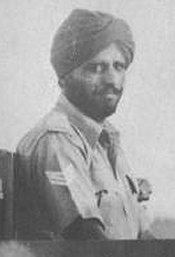Singh, Parkash (Ser. No. 14696)
- Date of birth:
- March 31st, 1913 (Sharikar, Lyallpur District, India)
- Date of death:
- March 23rd, 1991 (London, Great Britain)
- Service number:
- 14696
- Nationality:
- British-Indian
Biography
Do you have more information about this person? Inform us!
- Period:
- Second World War (1939-1945)
- Rank:
- Havildar (Sergeant)
- Unit:
- 8th. Punjab Regiment, Indian Army
- Awarded on:
- May 13th, 1943
"On the 6th January, 1943, at Donbaik, Mayo Peninsula, Burma, when two Carriers had been put out of action, Havildar Parkash Singh drove forward in his own Carrier and rescued the two crews under very heavy fire. At the time, the crews of the disabled Carriers had expended their ammunition and the enemy were rushing the two disabled Carriers on foot. This N.C.O.’s timely and courageous action, entirely on his own initiative, saved the lives of the crews and their weapons. On the 19th January, 1943, in the same area, three Carriers were put out of action by an enemy anti-tank gun and lay on the open beach covered by enemy anti-tank and machine-gun fire. One of these Carriers was carrying the survivors of another Carrier in addition to its own crew. Havildar Parkash Singh, on seeing what had happened, went out from a safe position in his own Carrier, and with complete disregard for his own personal safety, rescued the combined crews from one disabled Carrier, together with the weapons from the Carrier. Having brought the crews to safety, he again went out on the open beach in his Carrier, still under very heavy anti-tank and machine-gun fire and with the utmost disregard for his personal safety, dismounted and connected a towing chain on to a disabled Carrier containing two wounded men. Still under fire, he directed the towing of the disabled Carrier from under enemy fire to a place of safety. Havildar Parkash Singh’s very gallant actions, entirely on his own initiative, were an inspiration to all ranks both British and Indian."
Later promoted to the rank of Major.
Havildar Parkash Singh's Victoria Cross is publicly displayed at the Imperial war Museum in London, Great Britain.
Parkash Singh, Golders Green Cematorium, North West London, Great Britain. Ashes returned to Pubjab, India.
- Period:
- Second World War (1939-1945)
- Period:
- Second World War (1939-1945)
- Period:
- Second World War (1939-1945)
- Period:
- Second World War (1939-1945)
- Period:
- Second World War (1939-1945)
Sources
- Photo: Wikipedia
- - Victoria Cross Reference
- The Register of the Victoria Cross - uitgegeven door This Engeland 1997 - ISBN 0906324270
- Speciale dank aan Iain Stewart van The History of the Victoria Cross
- Page 2141 | Supplement 36013, 11 May 1943 | London Gazette | The Gazette
- http://www.victoriacross.org.uk










